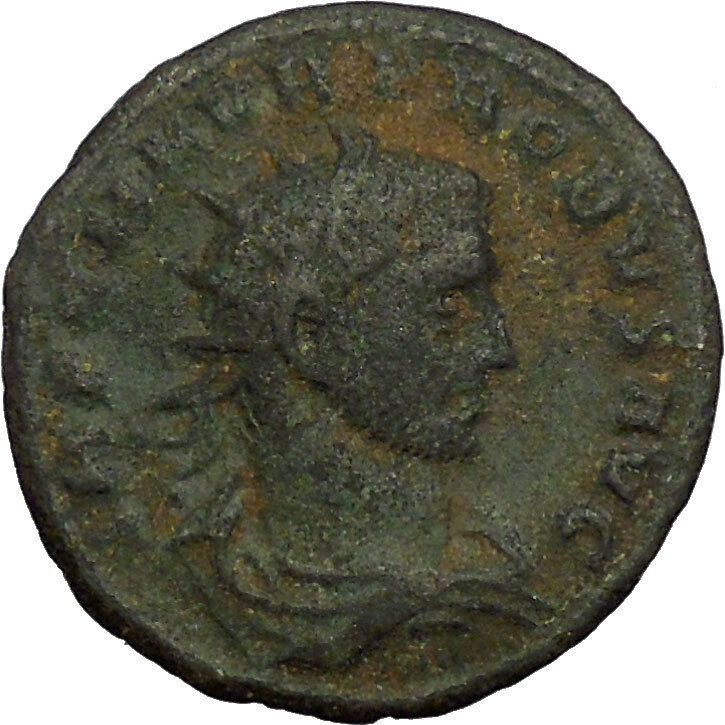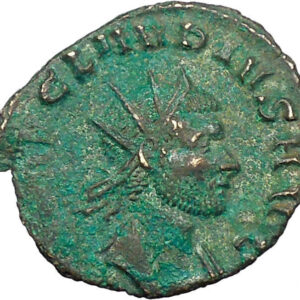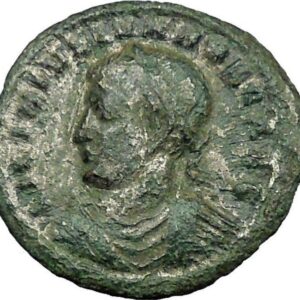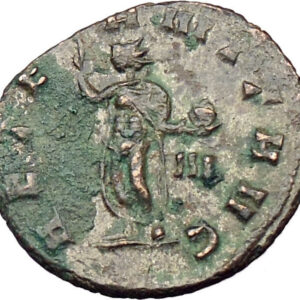|
Commodus
–
Roman Emperor
: 177-192 A.D.
Silver Denarius 17mm (2.85 grams) Rome mint: 190-191 A.D.
Reference: RIC 222, C 358
COMMANTPFELAVGBRITPP – Laureate head right.
MINAVGPMTRPXVICOSVI – Minerva advancing right, holding branch and spear with
shield.
You are bidding on the exact item pictured,
provided with a Certificate of Authenticity and Lifetime Guarantee of
Authenticity.
Minerva (Etruscan: Menrfa, or Menrva) was the
Roman goddess
whom Hellenizing Romans from the
second century BC onwards equated with the Greek
goddess
Athena
. She was the virgin goddess of
poetry
,
medicine
,
wisdom
,
commerce
,
weaving
,
crafts
,
magic
, and the inventor of
music
. She is often depicted with an owl, her
sacred creature and is, through this connection, a symbol of wisdom.
This article focuses on Minerva in ancient Rome and in
cultic practice
. For information on Latin
literary mythological accounts of Minerva, which were heavily influenced by
Greek mythology
, see
Pallas Athena
, where she is one of three virgin
goddesses along with
Artemis
and
Hestia
, known by the Romans as
Diana
and
Vesta
.
Etruscan
Menrva
The name “Minerva” is imported from the
Etruscans
who called her
Menrva
. Extrapolating from her Roman nature, it
is assumed that in
Etruscan mythology
, Minerva was the goddess of
wisdom, war, art, schools and commerce. She was the Etruscan counterpart to
Greek Athena
. Like Athena, Minerva was born from the
head of her father, Jupiter (Greek
Zeus).
By a process of
folk etymology
, the Romans could have confused
the phones
of her foreign name with those of the
root
men- in
Latin
words such as mens meaning “mind”, perhaps because one of her
aspects as goddess pertained to the intellectual. The word mens has the
Proto-Indo-European
mn- stem, linked
with memory as in Greek
Mnemosyne
(μνημοσύνη) and mnestis (μνῆστις:
memory, remembrance, recollection).
Cult
in Rome
Menrva was part of a holy
triad
with
Tinia
and
Uni
, equivalent to the Roman
Capitoline Triad
of Jupiter-Juno-Minerva.
Minerva was the daughter of Jupiter.
As Minerva Medica, she was the goddess of medicine and doctors. As
Minerva Achaea, she was worshipped at
Luceria
in
Apulia
where
votive gifts
and arms said to be those of
Diomedes
were preserved in her temple.
In Fasti
III,
Ovid called her the “goddess of a thousand works.” Minerva was
worshipped throughout Italy, though only in Rome did she take on the warlike
character shared by Athena. Her worship was also taken out to the empire — in
Britain, for example, she was conflated with the local wisdom goddess
Sulis
.
The Romans celebrated her festival from March 19 to March 23 during the day
which is called, in the neuter plural,
Quinquatria
, the fifth after the Ides of March,
the nineteenth, an
artisans
‘ holiday . A lesser version, the
Minusculae Quinquatria, was held on the Ides of June, June 13, by the
flute-players
, who were particularly useful to
religion. In 207 BC, a
guild
of poets and actors was formed to meet
and make
votive offerings
at the temple of Minerva on
the
Aventine
hill. Among others, its members
included
Livius Andronicus
. The Aventine sanctuary of
Minerva continued to be an important center of the arts for much of the middle
Roman Republic
.
Minerva was worshipped on the
Capitoline Hill
as one of the
Capitoline Triad
along with Jupiter and Juno,
at the
Temple of Minerva Medica
, and at the “Delubrum
Minervae” a temple founded around 50 BC by
Pompey
on the site now occupied by the church
of
Santa Maria sopra Minerva
facing the
present-day Piazza della Minerva.
Lucius
Aurelius Commodus Antoninus (31 August 161 – 31 December 192) was a
Roman
Emperor
who ruled from 180 to 192
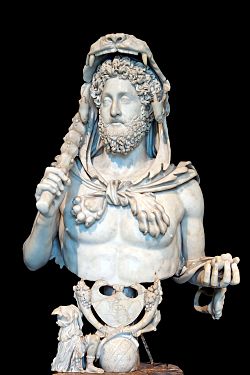 (also with his father, (also with his father,
Marcus Aurelius
, from 177 until 180). The name given here was his official
name at his accession to sole rule; see
Changes of name
for earlier and later forms. His accession as emperor was
the first time a son had succeeded his father since
Titus
succeeded
Vespasian
in 79. Commodus was the first emperor “born
to the purple“; i.e., born during his father’s reign.
Commodus vies with Caligula and Nero as Roman history’s most perverse
and sadistic of rulers. Like Caligula and Nero before, Commodus was an ordinary
(by imperial standards) ruler who succeeded Marcus Aurelius, his father, upon
his death. In his one major positive deed, Commodus called off the expedition
against the Germans which his father had commenced on terms favorable to Rome.
He sped off to Rome where he much preferred living the perks of an emperor to
the dirty business of waging wars. While he whiled away his time pursuing a
hedonistic lifestyle he was happy to delegate administrative responsibilities to
others.
Unfortunately, his appointees never seemed to last long on
the job. Whether through incompetence, bad luck or corruption, one by one these
fell and needed replacement. Commodus little by little began gaining a taste for
power as the shuffling of his foremen took place and, finally, he decided to
manage the empire himself. It is starting with this period that Commodus began
to act increasingly unpredictably and cruel. A botched conspiracy against him,
orchestrated by no less than his beloved sister Lucilla, was discovered and his
surviving the episode turned him afterwards into a highly paranoid individual
who had countless officials executed for disloyalty imagined or real.
In his final year of life he shocked Romans of all classes by
personally moonlighting as a gladiator. Of course, these fights were arranged so
that he could invariably come out the victor. Because of this a record-breaking
700+ victories were scored in his name, each one ending in the deaths of one or
more gladiators and/or wild beasts at the Colosseum. A successful conspiracy
against him was finally hatched by one of his lovers who first tried poisoning
him but he threw up and a wrestler was summoned who strangled him to death on
the last day of the year 192.
The recent Hollywood release “The Gladiator” is a
fictionalized account of Commodus as emperor which has him at odds with a
popular gladiator.
|




 (also with his father,
(also with his father,